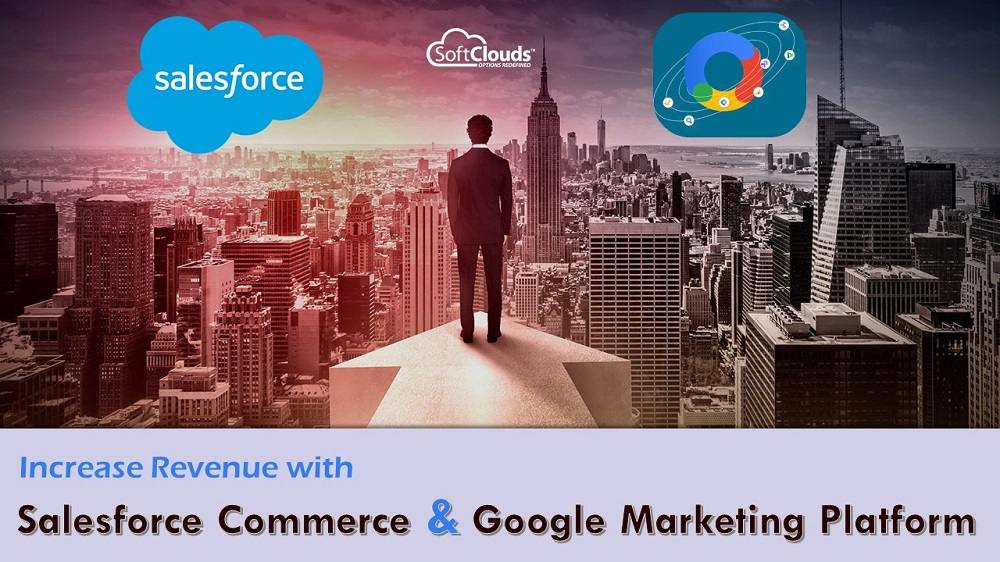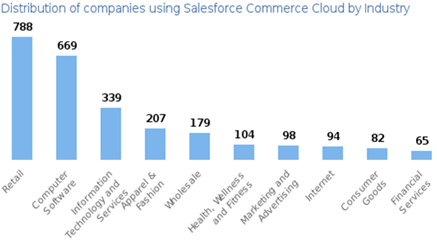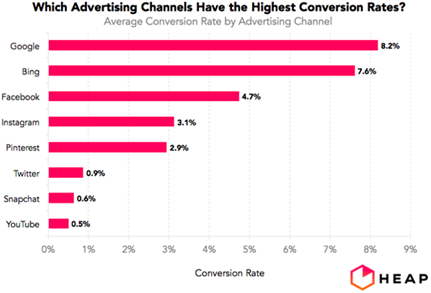Increase Revenue with Salesforce Commerce
and Google Marketing Platform


Companies across different verticals are now going digital to empower their businesses by leveraging current e-commerce-friendly technologies and platforms to boost their presence online. Salesforce Commerce Cloud is a highly preferred choice for modern-day companies and is an industry-leading e-commerce platform. It’s growing at a rate of 14% annually, where both B2B and B2C companies are the primary user base. [1]
Retailers must constantly reinvent and build strategies to attract traffic to increase revenues. Most companies fail to grow beyond a certain threshold due to less visibility since traffic generation involves higher costs. Marketers need to understand the end-to-end customer journey so the organization can gain insights and act on the most influential touchpoints for customers. This business problem can be addressed by leveraging the world’s most popular CRM, Salesforce.
This article discusses the potential solutions of Google Marketing Platform and how these products can be leveraged to accelerate marketing plans with unified advertising and analytics to achieve marketing goals for Salesforce Commerce users.

Google Marketing Platform (GMP) offers digital advertising, online shopping, analytics application, powerful search capabilities, and an effective cross-channel marketing solution. It’s intended to be a unified solution for merging data and enhancing marketing throughout channels and devices. The platform combines Google’s DoubleClick and Analytics 360 technologies, allowing businesses to oversee their customers’ journey from beginning to end.
It brings together various Google marketing solutions in a single cloud platform, including display, search, video, web analytics, and data platform. The best part of GMP is that it makes connecting one product to another easier by enhancing the integration capabilities. This involves third-party data management systems like CRM, CDP, and DMP. When creating a single view of the audience profile is simple; it serves the objective of bridging data silos and having access to rich insights.
Google Tag Manager is a free tag management system (TMS) that lets users manage all marketing tags in one place without modifying the code. It works by sharing the information from one source to another data source. It helps make the process of tracking and collecting the marketing data seamless. Though GTM can track an infinite number of website activities for all business needs, there are some widely used tracking tags like PDF downloads, scrolling behavior, link clicks, form submissions, and video activities. Following are the benefits of GTM:
GTM easily integrates with Salesforce Commerce Cloud code and produces the desired results with implemented triggers and events. Tags are segments of code provided by analytics, marketing, and support vendors (FB, LinkedIn, Twitter, Google Analytics) to help you integrate their products into your websites or mobile apps.
Google Analytics is a free web traffic analytics service by Google that helps marketers track, collect data, and generate reports in charts, graphs, and spreadsheets. It helps in tracking data like:
Google Analytics had a market share of 31.55% in 2021 in web analytics technologies preceding Google Universal Analytics and Google Global Site Tag. They had 24.04% and 17.96% market share, making Google’s total market share more than 70%. With the help of GTM, you can deploy Google Analytics tracking code quickly and in a single place, making it faster and cleaner. This makes developers’ lives easier as they don’t have to place the GA code on each page as GTM can manage it.[2]
Events and triggers can be defined in GTM according to the business requirements. All data generated can help you better analyze the site performance and take corrective actions wherever required. Since it integrates with GTM as a tag and GTM integrates with Salesforce Commerce Cloud seamlessly, one doesn’t have to worry about extra configurational overhead.
Google processes over 5.6 billion searches per day; each search provides an opportunity to generate sales. This is where you can leverage Google Ads. This solution lets you create online ads, which helps you to reach people when they search or are interested in a product. Through Google Ads, users can create online ads to get people exactly when they're interested in the products and services. Google Ads helps users promote their businesses, sell products or services, increase awareness, and increase relevant traffic to their website. [3]
Additional benefits of Google Ads include:

As Google Ads help you better promote your business in the same way Google Merchant Center (GMC) helps you promote your products right at the search time. GMC lets you showcase your products with images, prices, and descriptions when users search for a particular product. To leverage its full power, you need to provide GMC with your correct and current product data and details. Broader, faster, and visual reach to the customer is far more effective than any other way using GMC. Other benefits include:
Salesforce and GMP integration have laid a path for marketers to generate higher quality leads, increasing their companies’ revenue. Salesforce is the most powerful CRM tool, a goldmine of data about the customer journey. Using this tool, you can identify where the customer came to know about your company and utilize media to reach your commerce site. In that case, you can make competitive and relevant decisions to drive business growth accordingly.
This integration creates an effective and efficient ecosystem for businesses. By leveraging the power of both worlds, this e-commerce platform is backed with a strong backbone as Salesforce Commerce cloud provides a customizable, agile, and scalable e-commerce solution that integrates seamlessly with the Google Marketing Platform. With analytical reports, one can position themselves based on demand/supply and run campaigns accordingly. All the above marketing tools/features can generate better leads and higher conversion rates for your e-commerce platform, improving your ROI.
This post was written by a Nixon James, Director of Salesforce Practice at SoftClouds. Nixon has two decades of experience in innovating, designing, building, and delivering world-class CRM/CX/ DevOps/AI solutions around the globe to meet our clients’ digital transformational needs. Nixon is passionate about our clients’ goals and committed to making their vision a reality and client success his number one priority.
SoftClouds is a recognized leader in CRM/CX transformation with experience in numerous Service Cloud Implementations with pre-configured best practice business processes for multiple verticals/domains.
To learn more about this topic, please click here.